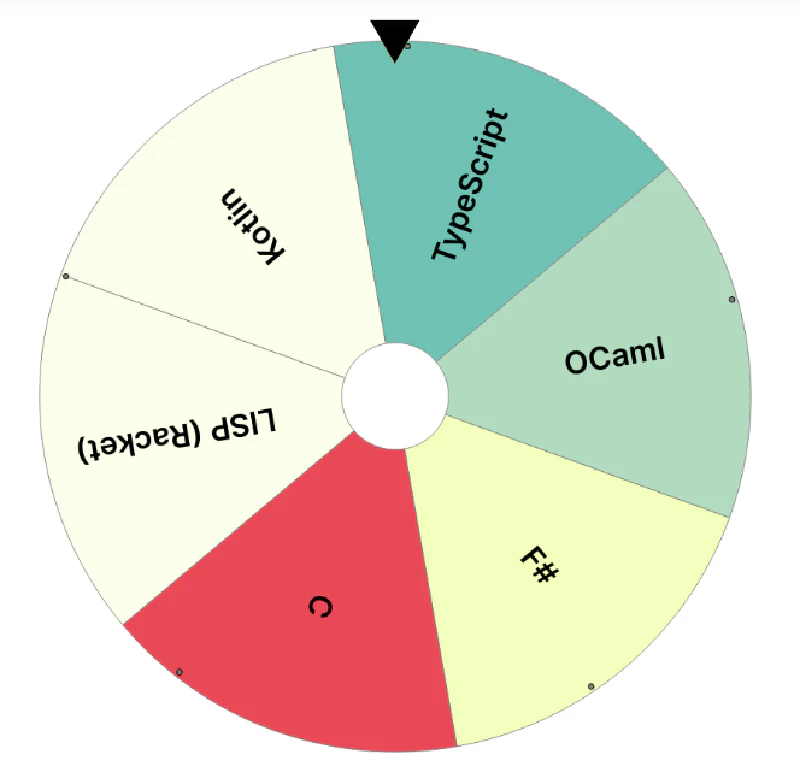Posted
on
in
Programming
• 1067 words
• 6 minute read
Tags:
Advent of Code, Wheel Spinner, Competition
Every year since 2015, Eric Wastl creates a two-part programming problem for each of the 25 days of Advent. He publishes a new problem every day at adventofcode.com at exactly midnight EST which is 22:00 the day before for me in MST. The last two years, I decided to do the problems as soon as they came out and streamed my problem solving sessions on my Twitch channel and uploaded them to my Youtube channel. The last two years I updated a blog post about each of the days, and I will try and do that this year as well.
This year, I’m leaving my fate up to chance by spinning a wheel every night which will dictate what language I use for that night.

The random spinner wheel which will decide my fate every night
I’m going to be streaming some of my solves and I will try and keep this blog post up-to-date every day with my thoughts on each problem.
Summary of Results
The following are my results across all of the days.
-------Part 1-------- --------Part 2--------
Day Time Rank Score Time Rank Score
7 01:11:56 8044 0 02:06:29 8720 0
5 01:14:02 9429 0 - - -
2 00:44:29 9493 0 >24h 94541 0
1 00:11:38 5636 0 00:21:47 2021 0
Language statistics:
$ tokei -e '*.txt' -e '*.json'
===============================================================================
Language Files Lines Code Comments Blanks
===============================================================================
Batch 1 92 71 0 21
F# 3 78 63 5 10
Kotlin 4 171 115 31 25
MSBuild 4 44 38 0 6
OCaml 2 229 189 19 21
Shell 1 249 106 117 26
TypeScript 1 48 44 0 4
===============================================================================
Total 16 911 626 172 113
===============================================================================
Day 1: Trebuchet?!
| Link: | https://adventofcode.com/2023/day/1 |
| Solutions: | TypeScript |
| Part 1: | 00:11:38, 5636th |
| Part 2: | 00:21:47, 2021st |
Today I spun TypeScript! I spent most of my time figuring out how to read
from stdin in Node. There was a lot of DuckDuckGo-ing involved.
I ended up finding how to use the readline.createInterface and adding a line
listener which added all of the lines to an array and a close listener which
did the actual computation.
Day 2: Cube Conundrum
| Link: | https://adventofcode.com/2023/day/2 |
| Solutions: | F# |
| Part 1: | 00:44:29, 9493th |
| Part 2: | >24h, 94541st |
Today I spun F#! It took me a long time to just install and learn how to read input in F#, and then it took an even longer time to solve part 1 since I wasn’t really sure what functions I could even use. F# has some constructs that are similar to other functional languages that I’ve used in the past, which helped the learning curve.
I was hampered by not having syntax highlighting and a language server. I’ll have to figure that out before I spin F# again.
I don’t think that I did anything super novel today, so I’m not going to make comments about either of the parts.
Day 7: Camel Cards
| Link: | https://adventofcode.com/2023/day/7 |
| Solutions: | OCaml |
| Part 1: | 01:11:56, 8044th |
| Part 2: | 02:06:29, 8720th |
Today I spun OCaml! It took a very long time for me to get into functional
programming mode. The first task was to parse the hand into a tuple of
(hand_type, hand_values) where hand_values was just a tuple of integers
representing the card values.
In order to do that, I sorted the characters in the hand and then compressed
them into a sorted list of (count, character) tuples. Then, I pattern matched
on the different possible combinations of counts. For example, if you have
AA233, then it would sort into:
[(1, '2'); (2; 'A'); (2, '3')]
which I was able to pattern match with:
match hand with
...
| [_; (2, _); (2, _)] -> (TwoPair, ...)
It took me a very long time to figure out how to do it properly, but eventually I was able to get it.
I had a really horrible part 2 delta because my pattern matching-foo was not very good, and I missed a couple of cases that forced me to just debug through each hand one at a time.
Day 8: Haunted Wasteland
| Link: | https://adventofcode.com/2023/day/8 |
| Solutions: | F# |
| Part 1: | 00:20:16, 5859th |
| Part 2: | 00:42:07, 2970th |
Today I spun F#. It was quite fortunate, because this problem was inherently pretty recursive in nature. Trees problems are normally very amenable to recursive thinking. The problem for me was that I couldn’t recursively think.
For part 1, I got away with a non-tail-recursive function. I’m not sure if the non-tail-recursive approach works for part 2 or not, but in my attempts to optimize part 2 I converted to use a tail-recursive approach which was sufficiently space-efficient. This is the core of the algorithm. I think it’s quite clean.
let rec step_p1 current directionIdx =
if current = "ZZZ" then
directionIdx
else
let (left, right) = map[current]
match directions[directionIdx % directions.Length] with
| 'L' -> (step_p1 left (directionIdx + 1))
| 'R' -> (step_p1 right (directionIdx + 1))
| _ -> failwith "invalid direction"
printfn "%A" (step_p1 "AAA" 0)
Update: as you can tell from the lack of posts, I decided to give up on this year. I had a very busy early December due to lots of grading finishing up the fall semester as well as a quite busy time at work (we released Beeper Mini).
I’m hoping that next year I’ll be able to get back to this and spin the wheel again!
